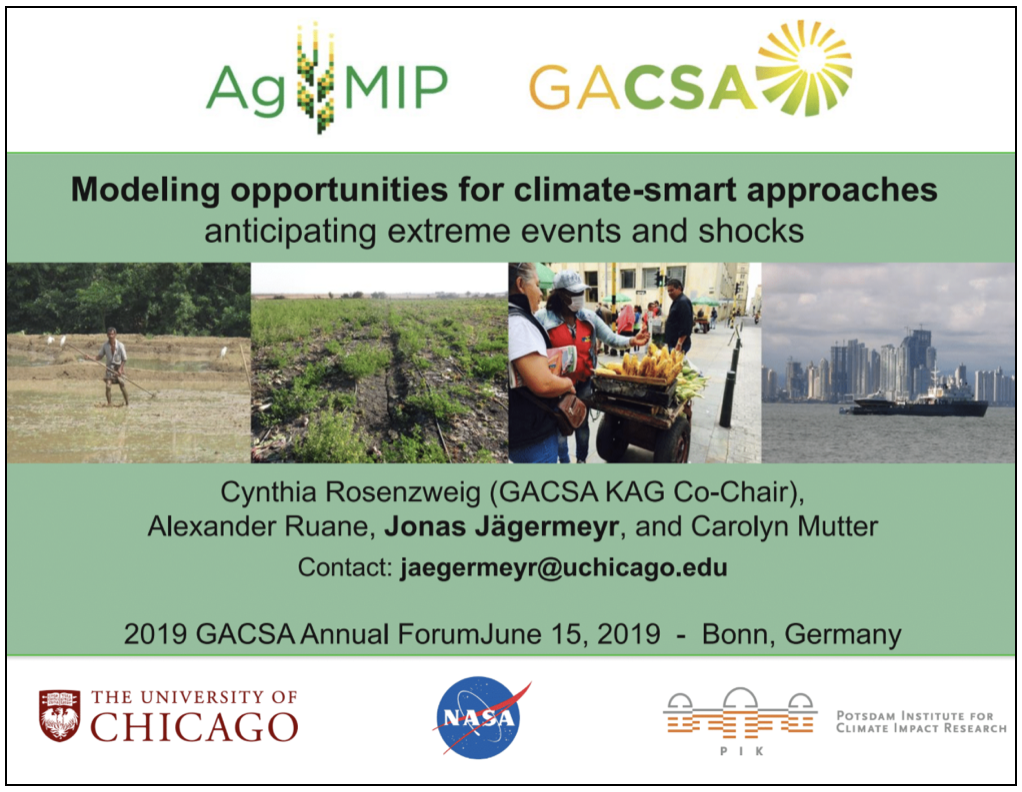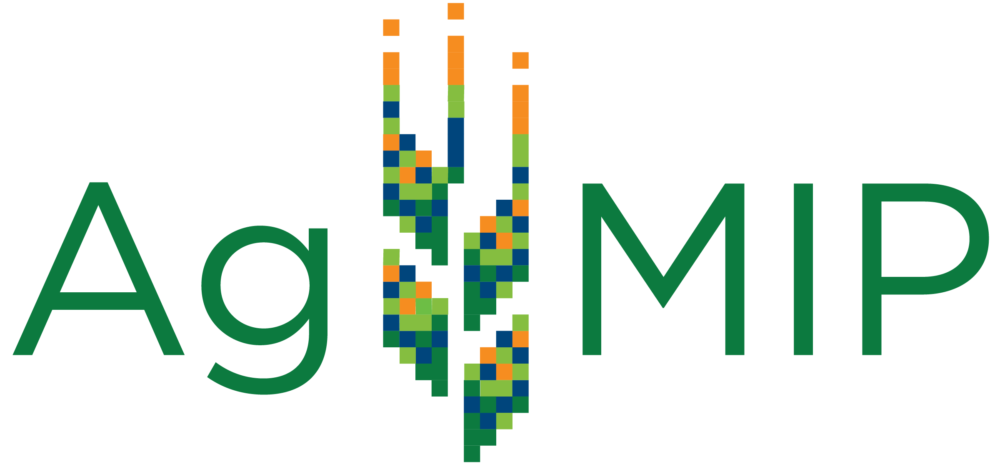AgMIP at the Global Alliance for Climate-Smart Agriculture (GACSA) Forum
Jun 24, 2019
The third Global Alliance for Climate-Smart Agriculture (GACSA) Annual Forum was held on June 15-16, 2019, in Bonn, Germany. Honored speakers such as Karen Ross (Secretary of the California Department of Food and Agriculture), Zitouni Ould-Dada (Deputy Director of the Climate and Environment Division, FAO), and Hans Hoovegeen (Netherlands representative to the FAO) contributed to thishigh-level event.
Jonas Jägermeyr, Science Collaborator at NASA Goddard Institute for Space Studies, presented a keynote on behalf Cynthia Rosenzweig, AgMIP Executive Committee Member, on “Modeling opportunities for climate-smart approaches anticipating extreme events and shocks”.
GACSA is an inclusive, voluntary, and action-oriented multi-stakeholder platform on Climate-Smart Agriculture (CSA). GACSA aims to catalyze and help create transformational partnerships to encourage the three pillars of Climate-Smart Agriculture (CSA) – productivity, adaptation and mitigation.
The 3rd GACSA Annual Forum 2019 aimed to continue the work towards the GACSA vision of working together to ensure that the world’s agriculture can sustainably feed and nourish humanity and secure livelihoods in the face of a changing climate.

Jonas Jägermeyr started his presentation on how climate extremes and production shocks challenge CSA approaches. Providing enough nutrient rich foods to everybody, but especially the poor, becomes a major challenge in view of increasing meteorological, hydrological, and climatological extreme events. Jonas’ presentation aimed at emphasizing a new focus within CSA, that is, climate resilience and stabilizing inter-annual yield fluctuations.
Jägermeyr explained that a historical down trend in world food prices is repeatedly interrupted by dramatic spikes — due to for instance climatic events, energy prices, or trade policies – which can cause severe aftereffects such as increased number of malnourished, social unrest, and migration.
AgMIP is interested in better connecting climate change and disaster communities, while adaptation-oriented applications across time horizons need to be understood to build more resilient systems. Jägermeyr continued by discussing topics such as: shifting risk with climate change, how irrigation can buffer impacts from heat waves and droughts, and the fraction of land area and people impacted by future extreme events.
Earlier this year, the Aspen Global Change Institute (AGCI) in collaboration with the Agricultural Model Intercomparison and Improvement Project (AgMIP) held the ‘Next-Generation Food Shocks Modeling Workshop’ on May 20-24, 2019, in Aspen, Colorado. This high-level community emphasized the importance of better understanding food shocks beyond just yields, by integrating all aspects of the food system: from crop modeling to local and global market analysis, household economy and consumption pattern, to nutritional aspects.
Jägermeyr emphasized in his presentation at the GACSA Annual Forum that yield shocks continue to surprise and we need to improve early warning systems and better understand price reactions. He then explained how there are both anticipated shocks such as Climate Change and unanticipated shocks such as a multiple breadbasket failure. To move the discussion beyond average yields we must shift focus to understand resiliency and stabilize interannual variability.
Jonas ended his presentation with two examples of successful policy intervention.
The Regional Integrated Assessment initiative within AgMIP was created to bridge the gap between science, local stakeholder, and farmers in an iterative learning-process. Results from Zimbabwe illustrate a promising 5-year implementation plan for mixed cop-livestock systems with large benefits for the poorest if yield increases based on water management improvements enable long-term investment horizons.
Policy interventions to offset short-term losses and build long-term resilience in the Philippines include drought-tolerant seed varieties and additional irrigation (farm), subsidized food imports during shock and removed trade bans and import quotas (market), and distribute stored grains and cash transfers for poor households (social). .
As a conclusion, Jägermeyr described the road ahead in terms of opportunities for enhanced resilience against unforeseen events:
- Incorporate resilience building in CSA approaches, especially in view of shocks
- Work with Community and National Planners and other Stakeholders to identify and investigate priority vulnerabilities of agriculture and food systems.
- Investigate future farming systems under changing climate and sociopolitical contexts for foresight into coming challenges and climate-smart solution spaces
- Explore food shock decision contexts that would benefit from better scientific information and policy approaches.
- Develop and improve operational forecasting and early-warnings systems
- Test provisional plans with model-based assessments of anticipatory (resilience) and reactive (responsive) adaptations to food shocks.
